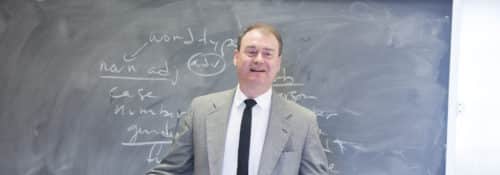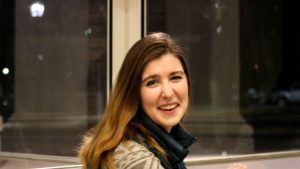
An Afternoon of Time-Travel
Written by Jacquelyn Eubanks
I walked into the classics room in Kendall Hall on a Friday at 4 p.m., and my eyes were immediately drawn to a large, kaleidoscopic bowl of fruit. Kiwis, apples, bananas, pears, and grapes were nestled in aesthetic arrangement, and surrounding the bowl, strewn across a long table, were hardcover books—Greek and Latin dictionaries open and resting on pedestals. At the front of the room, a PowerPoint glowed on the projection screen. The topic? Pergamon and art of the Hellenistic Age.
I sat down beside the bowl of fruit and noticed several cartons of pastel-colored gelatos.
“Would you like some espresso?” a bespectacled professor asked me. “The way to do it is to add some hazelnut gelato to it. That’s how they do it in Italy.”
Of course I couldn’t pass it up. As the classics professor, who I later learned was Dr. Garnjobst, set up the espresso maker, a visiting professor named Dr. Fincher clicked through slide after slide of Hellenistic art, explaining each piece’s significance and how it differed from older Greek art.
As I was handed my small cup of espresso—one of the strongest brews I’ve ever had—I asked Dr. Garnjobst how this all got started.
He explained that he often travels to Italy, Greece, and Turkey through the College’s summer abroad programs for high schoolers. He loves the experience of being immersed in the ancient history, different languages, food, customs, architecture, and culture of those areas, and he wants to keep that experience alive throughout the school year. He decided to continue learning and exploring different aspects of the ancient Roman and Greek civilizations, and came up with a way to share those findings for fun with any interested students.
The fruit, however, has a different beginning. About ten years ago, Dr. Garnjobst taught an 8 a.m. class and noticed that his students always rushed out the door as soon as the class ended so they could get to the dining hall before breakfast closed. He realized with sympathy that they didn’t have time to eat before class and spent the whole period hungry. He decided to start bringing in fruit for them to eat during class on Fridays, and the tradition became known as “Fresh Fruit Fridays.”
Therefore, “Renaissance Friday” got its start as a combination of Dr. Garnjobst’s love of ancient culture and his generosity in providing fruit. But why call it “Renaissance” Friday? Renaissance means “rebirth” and usually refers to an era that marked a period of rediscovery of the classics. Renaissance Fridays are an opportunity to dive into the ancient world and learn things you would not have known if you hadn’t stopped by.
In my case, I happened to mention that I’m a writer, and that I’ve studied the modern novel extensively. I mistakenly said I thought the ancient Greeks and Romans only wrote plays and epic poetry. As soon as the words came out of my mouth, the group launched into a discussion about the first novel ever written, which apparently was written during the Hellenistic Age, and included many of our present-day storylines: star-crossed lovers, courtroom dramas, kidnapping and ransom demands.
My interest was piqued, and I hungered to learn more about the ancient world. I never realized how very little I knew about the Greeks and Romans, and what I discovered over the course of two hours in one afternoon fascinated me. I left wanting to learn Latin and to read Greek novels. I left feeling like I’d just toured the Hellespont. I know I’ll be going back to that little room in Kendall Hall—not just for gelato and pears, but for the stimulating conversation and the discovery of a world I’ve yet to explore.
 Jacquelyn Eubanks, ‘20, is an award-winning author with a passion for books, tea, and mountains. Someday she’ll be a world traveler, but for now you can find her typing away at her newest novel.
Jacquelyn Eubanks, ‘20, is an award-winning author with a passion for books, tea, and mountains. Someday she’ll be a world traveler, but for now you can find her typing away at her newest novel.
Published in February 2019